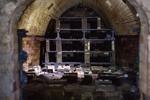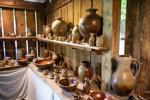Growing up in Nelson County, Noah Hughey-Commers said the richness of his own life, his family’s life and his community’s life has revolved around food — which pairs well with pottery.

Pieces made by Noah Hughey-Commers, owner of Muddy Creek Pottery, sit on display during the Nelson Artist Spring Tour on May 14. Hughey-Commers specializes in wood-fired pottery, a subset of pottery where ceramics and pots are fired with only wood in a large kiln.
Naturally, potters are really into good food, he said earlier this month at his studio, Muddy Creek Pottery in Nelson County.
Most of what he creates is to be used — not to just sit on a shelf and never come down.
“I spent a lot of time thinking about what to make, and I think it comes from those values of family getting together, and these things that I’m making are items of beauty but they’re also totally functional and they’re made to be used and they’re there to elevate the experience of those moments and not to be put on a wall, necessarily,” said Hughey-Commers, 36.
“I got into it really early,” he said about pottery. “I started firing kilns when I was pretty small. I was exposed to it growing up and I was really fascinated. I have always been fascinated about working on a wheel. It’s a mesmerizing, exciting process.”
People are also reading…
He said he enjoys how malleable and forgiving clay is.
“If you don’t like it, you can smash it up and do it again,” he said.

The kiln where Noah Hughey-Commers, owner of Muddy Creek Pottery, fires his pottery is seen at his studio during the Nelson Artist Spring Tour on Saturday, May 14, 2022.
At about age 10, Hughey-Commers was making pots casually until he went away to college to study English and left pottery for a few years.
He returned to Nelson County to complete a two-year apprenticeship and later spent time abroad in Europe and created some pottery in the United Kingdom. When he came back to stay, he decided to start his own business on the property he grew up in right outside of Lovingston and finished building his kiln in 2015.
Kevin Crowe, owner of Tye River Pottery, met a then-4-year-old Noah 32 years ago at a community Easter gathering.
“We became close friends with his family, and Noah bonded with my two sons and they grew up like brothers and continue to be close,” he said.
Hughey-Commers attended firings at Tye River Pottery as a child and through his college years.
“Upon graduation, he asked me if he could hang around the pottery for a couple weeks before he had to look for work,” Crowe said. “When the weeks passed he asked if he could apprentice. I told him our relationship would change from being friends to teacher-apprentice, which is what he wanted.”
For two years, Hughey-Commers worked with focused energy at the wheel, the kiln and every aspect of running a wood fired pottery, Crowe said.
“Over mandatory afternoon tea we discussed aesthetics, philosophy, the challenges of being an artist in contemporary culture. The intersection of slow work and short attention spans,” he said. “Noah’s work ethic was fueled by his passion and curiosity.”

Pieces made by Noah Hughey-Commers, owner of Muddy Creek Pottery, sit on display during the Nelson Artist Spring Tour on Saturday, May 14, 2022.
Hughey-Commers finished his apprenticeship and took work in a cabinet shop. He spent any spare time traveling the state tearing down old kilns and salvaging fire brick, Crowe said.
When the brick pile was large enough he began excavating the kiln’s footprint and five years after leaving Tye River, Hughey-Commers had Muddy Creek Pottery’s first firing.
“Noah set a very high bar for apprentices here,” Crowe said. “The studio, kiln and community he has created and the pots he makes reflect his patience, his commitment to high standards and generosity.”
Crowe said he is honored to have Hughey-Commers as a peer and good friend.
“No longer master and apprentice, we help each other with firings, trade and borrow hunches, tools and kiln shelves. We still get together for tea and continue the relentless exploration of what it means to a potter, what we do how we do it and why it matters. I am a lucky man,” he said.
Hughey-Commers’ wood-fired style is more traditional than others and is rooted in Japanese pottery.
Wood-fired pottery is a small subset of pottery where ceramics and pots are put into a large kiln and are fired with only wood. He fires twice per year, once in the spring and again in the fall, for multiple days at a time at 2,400 degrees.
“It’s manually intensive and this process takes a long time,” he said.
There’s a lot of risk involved as he meticulously places six months of work into the kiln to fire.
“A lot of people haven’t come in contact with this kind of work,” he said. “People look at it and they’re like, ‘You’re crazy, why you do this?’ because what I’m doing is I’m melting ash over pottery for like four days at a time.”
He also brings in a team of 10 people who come to help, stating it just can’t be done alone.
“It’s just sort of an intense and rewarding process,” he said. “It’s not dying out, but it’s not common anymore.”
There are much easier ways to do this though, Hughey-Commers said. Most potters use a gas or electric kiln and turn on a switch, he said.
“What I’m doing is very much primitive. And it’s traditional too. It’s the way that people had been doing it for thousands of years,” he said.
For a while it was a part-time gig, just learning how to combine his craft with marketing and selling the product, but last year, Hughey-Commers decided to go full time with his business.
It’s been 20 years of throwing clay on the wheel, sometimes throwing it away and starting over, firing and selling pottery. Hughey-Commers can look back and see the ways he has improved and the ways he’s made it unique, adding he knows it’s not for everyone.
“I think beauty is always in the eye of the beholder,” he said. “And the work that I do is so specific that it’s not for a lot of people. It’s earth-toned, the surfaces are varied but they’re not bright and shiny by modern context. So I think it’s hard to justify and explain yourself. It’s funny at craft fairs; you can tell who lights up when they see the pottery and who will just walk by.”
When he’s not molding clay, Hughey-Commers enjoys kayaking, spending time on the river, hanging out with friends and riding his motorcycle. He said he’s still learning how to market himself and his business.
“I love to make pots but I don’t enjoy selling them that much,” he said. “If you’re trying to make something, you have to know how it sell it. This is the irony of going to art school or being an English major and trying to avoid going to business school, and then you get out there and it turns out you’re a business person.”
Though arts and culture are picking up and getting more attention in the Nelson County area, he said he still feels a bit lonely in his line of work.
“I wish there was more people at least working at a certain caliber here because it would get more people to the area for this,” he said. “And I’d love for this economy to be that of arts. It does feel like there’s a growing arts community here, but like everything in Nelson County, it’s growing slowly,” he said.
"traditional" - Google News
May 24, 2022 at 06:45AM
https://ift.tt/21laKN7
Nelson County potter finds 'intense and rewarding process' in traditional wood-fired style - Lynchburg News and Advance
"traditional" - Google News
https://ift.tt/QuBozEn
Shoes Man Tutorial
Pos News Update
Meme Update
Korean Entertainment News
Japan News Update
Bagikan Berita Ini














0 Response to "Nelson County potter finds 'intense and rewarding process' in traditional wood-fired style - Lynchburg News and Advance"
Post a Comment